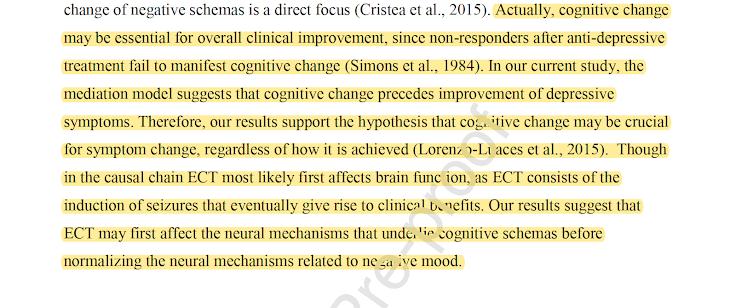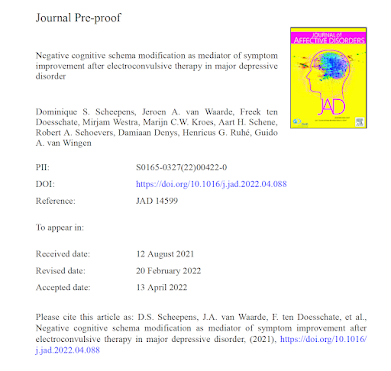Negative Cognitive Schema and ECT Response: Data From the Netherlands
Out on PubMed, In JECT, is this paper:
Negative cognitive schema modification as mediator of symptom improvement after electroconvulsive therapy in major depressive disorder.
J Affect Disord. 2022 Apr 28:S0165-0327(22)00422-0. doi: 10.1016/j.jad.2022.04.088. Online ahead of print.PMID: 35490877
The abstract is copied below:
Background: Electroconvulsive therapy (ECT) is a potent option for treatment-resistant major depressive disorder (MDD). Cognitive models of depression posit that negative cognitions and underlying all-or-nothing negative schemas contribute to and perpetuate depressed mood. This study investigates whether ECT can modify negative schemas, potentially via memory reactivation, and whether such changes are related to MDD symptom improvement.
Method: Seventy-two patients were randomized to either an emotional memory reactivation electroconvulsive therapy (EMR-ECT) or control memory reactivation electroconvulsive therapy (CMR-ECT) intervention prior to ECT-sessions in a randomized controlled trial. Emotional memories associated with patients' depression were reactivated before ECT-sessions. At baseline and after the ECT-course, negative schemas and depression severity were assessed using the Dysfunctional Attitude Scale (DAS) and Hamilton Depression Rating Scale HDRS. Mediation analyses were used to examine whether the effects of ECT on HDRS-scores were mediated by changes in DAS-scores or vice versa.
Results: Post-ECT DAS-scores were significantly lower compared to baseline. Post-ECT, the mean HDRS-score of the whole sample (15.10 ± 8.65 [SD]; n = 59) was lower compared to baseline (24.83 ± 5.91 [SD]). Multiple regression analysis showed no significant influence of memory reactivation on schema improvement. Path analysis showed that depression improvement was mediated by improvement of negative cognitive schemas.
Conclusion: ECT is associated with improvement of negative schemas, which appears to mediate the improvement of depressive symptoms. An emotional memory intervention aimed to modify negative schemas showed no additional effect.
Keywords: Electroconvulsive therapy; Emotional memory intervention; Major depressive disorder; Negative schemas.
The article is here.
And from the text:

This is a theoretically interesting study and paper, attempting to merge psychological and psychiatric constructs. In the end, I find it unconvincing and almost backwards; an analogy is trying to drive a car by turning the mileage numbers on the odometer...
There are many issues here, and I am trying not to be anti-intellectual, but the study population excluded most of the sickest patients and the ECT results were poor (low response and remission rates).The memory activation paradigm is very interesting, but not necessarily in the way it was used here; more interesting is its potential use to treat PTSD.
This is published in the Journal of Affective Disorders, so the reviewers thought it had considerable merit. I was glad to learn of the "Dysfunctional Attitude Scale."
I would be grateful for any comments from blog followers, thanks.





Comments
Post a Comment